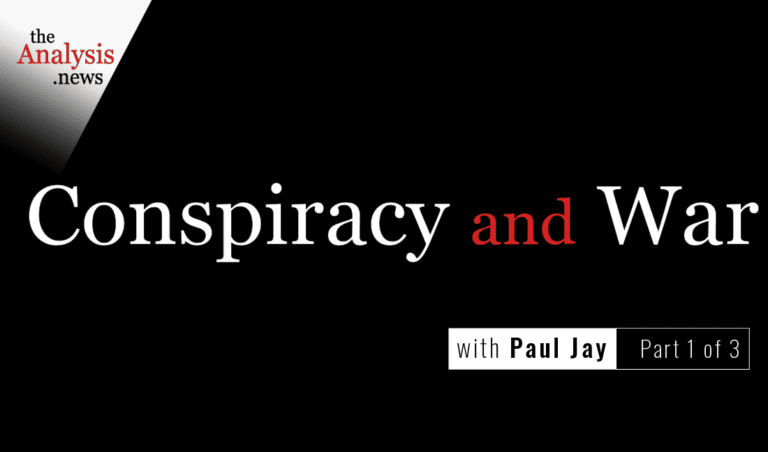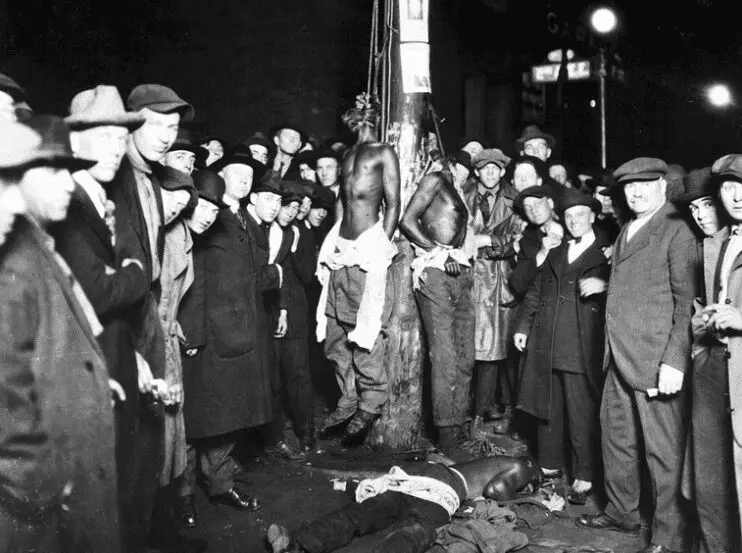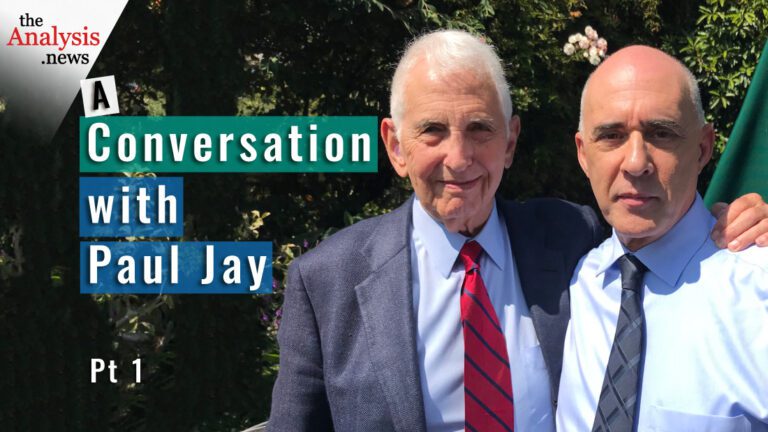Mr. Flassbeck, former head of UNCTAD, says current economic policy is heading back to the 1930s, a race to the bottom, they have no solution at all, we will end up again in trade wars or other wars. This is an episode of Reality Asserts Itself, produced July 29, 2014, with Paul Jay.
STORY TRANSCRIPT
PAUL JAY, SENIOR EDITOR, TRNN: Welcome back to The Real News Network. I’m Paul Jay. And this is Reality Asserts Itself.
We’re continuing our series of interviews with Heiner Flassbeck. And Heiner now joins us in the studio.
Thanks for joining us again.
Heiner worked at UNCTAD, the United Nations Conference on Trade and Development, and from 2003 to 2012 he was the director of the Division on Globalization and Development Strategies. Earlier in his career, amongst many accomplishments, he was the chief macro economist in the German Institute for Economic Research in Berlin between ’88 and ’98, and a vice minister from October ’98 to ’99 at the Federal Ministry of Finance in Bonn.
So in the end of the last interview you were saying you hope for–and I put the words in your mouth, but you kind of agreed–a reasonable, more rational capitalism than we have now. A few years ago, about three, four years ago, I was at a conference at Bretton Woods that George Soros organized with this think tank he’s created called INET, and he opened the conference and he looked out at everybody in the audience for quite a while, clearly trying to think of what to say, I think, and he started it with the words–he said, “I’m bewildered.” And he says, I don’t understand what’s going on. He says, it is so obvious that the speculation, financial speculation is completely out of control, that it’s going to lead to a disaster, and there’s things we could do about it, and no one will do anything, and it doesn’t matter what people like me say, no one’s listening to me, which suggests that maybe you can’t have this reasonable, rational capitalism. I’m not even suggesting Soros’s model is reasonable or rational. That’s another conversation. But you can’t get even the most weak-kneed regulation passed anymore, especially in the United States, but I don’t think Europe’s a heck of a lot better. You know, has that horse left the barn?
DR. HEINER FLASSBECK, FMR. DIRECTOR, UNCTAD DIVISION ON GLOBALIZATION AND DEVELOPMENT STRATEGIES: Yeah, it left the barn. That’s true. And it’s very difficult to get it back, for sure. I mentioned already that the Bretton Woods system, which was a reasonable approach to capitalism, so to say, was created under very unique circumstances that shook up the world.
JAY: Explain what that system was for people that don’t know.
FLASSBECK: Well, it was a system where we had strong regulation on capital flows; we had the banks diminished to their proper service work for the economy, to finance real investment; we had a global monetary system with rather fixed exchange rates so that not everybody could speculate with currencies; and all these things. We had a lot of provisions that made the system stable. And we had a strong intervention into the labor market on the one hand, or at least we had conditions on the labor market that gave people clearly the permanent expectation that they would get with [the people (?)] that they’re working for.
JAY: There was much higher unionization.
FLASSBECK: Yeah, there was higher unionization. And there was a mood in this confrontation with the East, with the planned economies, that the West had to give something, that you had to, so to say, calm down people by giving them the proceeds that they [were working for (?)]
JAY: Well, they had to–didn’t there have to–the Soviet Union was promising full employment, and capitalism had to promise full employment.
FLASSBECK: Yeah, yeah, absolutely. That is surely one of the reasons that we had this confrontation and the West had to give something to the people to calm down people and to make them happy in their system. The fight of the system was, in so far, quite productive, as it brought about a balance between capital and labor, which we after that never had again.
In the middle of the ’70s (we mentioned it already) we had the increase of unemployment, and then we had Thatcherism, Reaganism, and Reaganomics, and all that, and this led to a sharp shifting of the balance of power towards capital. And with the fall of the wall at the beginning of the ’90s, that process even became stronger and stronger all over the place because there was no confrontation anymore and there was nothing to be given to the [people (?)].
JAY: So isn’t that where we’ve come with Reagan and Thatcherism and has continued to today? Is that the not the more natural gravitation, then, of capitalism that the–you know, the Soviet Union posed a threat, real or imagined, but whatever, it was perceived that socialism actually was going to deliver a social safety net and full employment and so on and so on, so capitalism, particularly in Europe, both because of the strength of the unions but also because East Germany’s next door, has to prove that capitalism can give all these things and freedom, where the Soviet Union, you could only get this stuff if you give up your freedom, but once the Soviet Union, it starts to become clear, is on the way down and is probably going to implode, then that goes away, and then from that point on this is the capitalism?
FLASSBECK: This is the capitalism up to the point of the crisis. When we had the big crisis in 2008, then there was a chance to change things. And we still have the chance to change things, because we’re not out of the crisis, we’re not out of that crisis that started in 2008. So we’re in the year five or six after the crisis and we’re not yet out. So this is a plain disaster. This is the same thing as we had with the Great Depression in the ’30s. There was no confrontation of the system. The system, the planned system, Soviet Union and China, was not important for the thinking of the Northern or Western countries.
JAY: Well, it was certainly in the minds of people–.
FLASSBECK: [crosstalk] but it was not really the confrontation as after the Second World War and at that time. But at that time there were corrective forces. So the corrective force was the crisis. The big depression changed capitalism to a certain extent, and President Roosevelt was the one who did it. But looking back and looking into the history of the whole thing, it seems that it was due to a very few people, and President Roosevelt was clearly one of the most important ones who drove the whole thing into a different direction, who changed capitalism. And we haven’t found a person like that.
JAY: ‘Cause the alternative model to save capitalism was Hitler.
FLASSBECK: Yeah, yeah, yeah, absolutely. And, well, Hitler did it in his way. It was also the state who became strong. State did everything. The state produced full employment. So it was similar, but under different political circumstances.
JAY: Well, based on militarization.
FLASSBECK: Militarization, yeah, for sure.
JAY: Although some people argue it’s the same with Roosevelt, that the real solution here was the war.
FLASSBECK: Okay, yeah, but, well, we do not have to go into that, because that’s a difficult question.
But we do not have something like that, we do not have a shock like that, we do not have a person like that that would lead the world out of this desperate situation in which we are now. We have produced in Europe, in the last five years we have produced unemployment rates that are absolutely equal to the Great Depression. The United States is still in a stagnation of the overall economy. Monetary policy is trying desperately whatever is possible, these crazy things that everybody would have considered to be crazy things ten years ago and so on. So we have not left the recession and the recessive mode, and we’re not out of the crisis. We’re just trying to paper it over by extreme political measures because we haven’t understood what is at stake at this moment and what kind of critical point capitalism has reached because of the distributive changes that we have seen in the aftermath of the long period of high unemployment, the balance of power shifting towards capital and labor left behind.
JAY: And what shape is Europe in? Because it’s not on the headlines anymore. You know, a little while ago it was Greece, and before that it was Spain. But at least as far as American and North American news goes, it’s kind of off the front pages now.
FLASSBECK: Yeah, it’s coming back because of deflation. What we see now is clearly a move into deflation, a Japanese-like scenario. But what the Fed tried to prevent in the United States in the last years was a Japanese-like scenario where, after such a crisis, you fall into a deflationary mode. This is exactly happening in Europe. And the reason is very simple, but nobody talks about it. The reason’s very simple, namely, we’re cutting wages, we’re cutting everywhere wages. We have pressure on wages to be cut and wages to follow the German model, so-called model, where wages are not rising in line with productivity anymore. And this is done, executed, in Spain and Greece and Portugal. They’re trying to–starting with that in France or they’re talking about it in France and Italy, and this is already entering the whole European economy into a deflationary phase. And, again, it is the central bank. Everybody talks about a central bank there, their calculations–the IMF is joining in there–how much money the central bank has to spend now in buying bonds and under other assets to avoid deflation. Nobody talks about wages.
But it is absolutely clear, it’s obvious, the evidence is so clear they cannot–on nothing we have clearer evidence than on the fact that wages are determining prices. So unit labor costs–so this is the premium of wages, nominal wage increases over productivity–this determines inflation. It’s absolutely clear. But it is ignored by the whole profession. They’re ignoring this fact because–.
JAY: Break that down what you just said, or explain it, the formula on inflation.
FLASSBECK: So what it means is that as long as nominal wages rise in line with productivity, you have inflation zero. But all the countries want a certain positive inflation.
JAY: By “nominal” you mean real wages.
FLASSBECK: No, nominal wages. Nominal wages are the wages that people get.
JAY: That’s what I mean.
FLASSBECK: And these wages should rise in line with productivity, but, plus, in line with an inflation target. So if you have an inflation target of 2 percent, then nominal wages should rise in line with the productivity increase, the expected productivity increase, so to say, the trend of productivity that you have in a country–in the United States it would be 2 percent–plus the 2 percent for the inflation target, which would make 4 percent in the United States and in Europe overall. And only if you do that–.
JAY: Wage increases at 4 percent would keep a balance.
FLASSBECK: Yeah, that would keep a balance, and that would keep real wages rising by 2 percent, and it would keep the inflation rate on a stable growth path. This is exactly what you want, and to avoid deflation. As soon as you let high unemployment put pressure on wages, you have–the unions are weak, you have reduced unionization, and so on, then you get the imbalance. And the imbalance shows into things. The imbalance shows in nominal wages not rising in line with this formula that I just mentioned and not rising in line with productivity and inflation target. This puts pressure on deflation. And at the same time as real wages are falling, to a certain extent, at least, they reduce demand and we see rising unemployment. This is the situation in Southern Europe. In Southern Europe we had huge pressure on nominal wages. So nominal wages are cut by 10, 15 percent, which means that prices are falling by 10 percent. But, nevertheless, real wages are falling by 5 percent, and this depresses demand, and unemployment is rising. So what you get is deflation and rising unemployment at the same time.
This is the worst situation that you can imagine, because then monetary policy’s over. Monetary policy cannot fight that anymore, because they cannot go below zero percent [crosstalk] interest rate.
JAY: By “monetary policy” you mean lowering interest rates.
FLASSBECK: They cannot lower the interest rate below the zero bound, what economists call the zero bound, namely. Below zero it doesn’t make sense. If you don’t–if you ask people to pay money for a bank account, they don’t come anymore. They don’t bring it to a bank account anymore.
JAY: Well, your home, Germany, is essentially the powerhouse of Europe, and they’re kind of managing all of this. And do you not seem to mind what’s going on?
FLASSBECK: Well, unfortunately, we have a very poor–the poorest economic debate in the whole of Europe is happening in Germany. It’s not happening in Germany because nobody is discussing this question. We have a finance minister who has no clue about economics. He is talking about Swabian housewives, so to say, a micro example, as being the model for the economic policy, which doesn’t make sense at all. And the chancellor obviously is buying this kind of approach. So it’s really absurd. I’m not shying away from talking about it because I have to talk about my own country in these words, which is not the nicest thing you can do, but it’s really like that. It’s absolutely absurd. And I hope for a long time or for some time that the international discussion would change that a bit, but it’s not happening.
What we see is that France and Italy are following now. France has–the president, Hollande, has explicitly declared that he wants to follow the German model, and in Italy we hear similar things. But this doesn’t exactly work anymore. If France and Italy are following this policy that Spain and Portugal and Greece did already, then we will have rising unemployment in France and Italy, which will rise the unemployment rate in the whole of the European Monetary Union to 20 percent or something like that, plus we will see deflation, and then the euro will rise. So internationally it will have no repercussions and no positive effects for the Europeans, because the euro will rise. That is what we see already. The euro has risen by something like 10 percent against the dollar in the last months, since the beginning of the year. So the whole game is really absurd. It’s a race to the bottom. They’re running behind Germany. They’re racing towards a dead end. And the overall effect will be deflation and a deeper recession and more unemployment.
JAY: But isn’t that what the German and European elites had wanted for a long time? As long as the Soviet Union was there as this supposed alternative system, they had to do this big social safety net and good pensions and long maternity leaves, and they had to share with the working classes of Europe a fairly significant portion of the wealth. And now they don’t, and now they’re taking advantage of this crisis to break the back of this whole infrastructure that was created after the World War II. And it seems–you’re suggesting it’s very irrational and it’s heading to a dead end. But if I’m really rich and I’m sitting in Europe, maybe I’m thinking what I really want is I want an American style low-wage economy, I want a really weak working class, I want high unemployment, and I want to sell stuff to Asia. You know, the Chinese and Indians, Brazilians, whatever, they can buy our stuff, and we don’t have to share any of this wealth with the workers of Europe.
FLASSBECK: No, no. But it doesn’t work.
JAY: But do you not think that’s–must be how they’re thinking?
FLASSBECK: That’s what they’re thinking, yeah, that’s how they’re thinking, sure. But if they would be a bit more rational, they would understand that it cannot work, because the whole world cannot export anything to nowhere. And we all know the Chinese and the Indians will not be the ones who run huge current-account deficits and will take our goods. It’s just the other way around. They want to run current-account surpluses, so they want to sell more to our countries than the other way around.
JAY: Yeah. I mean, it’s going to start a worldwide race to the bottom.
FLASSBECK: Yeah, it’s a worldwide race to the bottom. That’s right. Europe is engaging or is maybe even the leader in that race to the bottom. But it doesn’t make sense for–every reasonable capitalist should think about, if the time horizon is at least, say, ten, 20 years, for someone who runs a company or owns a company, he or she should know that it cannot work, because you need consumers at the end, you need people who are able to buy the stuff that you’re producing. And you have–there are only your workers who are the ones who can buy the stuff that you’re producing. Otherwise, someone will lose. Well, then you can hope that you’re the survivor and the others will lose. Well, that always may be the motivation behind so micro economic decisions, but in the end it cannot work, and every reasonable capitalist should know it cannot work. You need consumers. You need people who earn money and earn not only money but earn as much as the productivity increase is in real terms, because otherwise the productivity increase, as such, will lead to unemployment. That’s absolutely sure.
And the United States was only, so to say, bridging the past 20 years by one instrument that is not there forever, by bringing down the savings ratio. You can survive a period where real income, real wages are not growing if the people are willing to reduce their savings ratio to zero or something like that, but more than zero is hardly possible, and then it’s over. Then the whole–.
JAY: Well, of the people that really own stuff and really wield political power–and I’m talking about that stratum of billionaires, the global oligarchs in all this–have you met any that–I mean, I should say there aren’t a–there are a few, I think, but there aren’t very many, would you say, that are, using your words, reasonable or rational.
FLASSBECK: No, that’s right. They are rational in their environment, maybe, in their microenvironment. They’re not looking at the overall economy. That’s right. And here we’re lacking politicians who are pushing for rational solutions–.
JAY: Well, they work for these various oligarchs, more or less.
FLASSBECK: That’s right. That’s–the plutocracy is what a plutocracy is. And that is why the plutocracy will hit the wall again. There’s no way out. There will be a new crisis sooner or later, a bigger crisis than we have seen, maybe, and then either we find someone who understands these mechanisms and these relationships and changes the world, a politician or political leader, or, I don’t know, the whole system will collapse. I mean, what you see in Europe now: you see that right-wingers are taking over everywhere. Look at Hungary. Look at France where the Front national is coming up.
JAY: Ukraine.
FLASSBECK: The right-wing party. And so this is the near-term solution, so to say, the political solution that you find, people who are saying, well, globalization has failed, Europeanization has failed, everything is failed, so we go back to our national frontiers and we close our borders, we live in splendid isolation.
JAY: Back to the 1930s.
FLASSBECK: Yeah, back to the 1930s. This is what is happening now. And then the race to the bottom for a time will be stronger than before, and at the end–but they have no solution at all, also no solution. And then we will end up again in trade wars or other wars.
JAY: Alright. We’re going to continue this discussion with Heiner Flassbeck on Reality Asserts Itself on The Real News Network.






